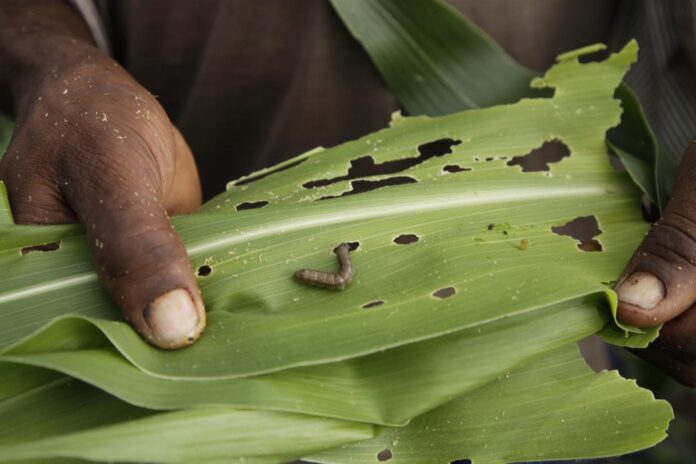Illustrative Image: Integrated Pest Management: Sustainable Solution to Combat Fall Armyworm (Spodoptera frugiperda) Threatening Africa’s Food Security
Image Source & Credit: FAO
Ownership and Usage Policy
A recent study by Togola et al. (2025) titled “Fall armyworm (Spodoptera frugiperda) in Africa: Insights into biology, ecology and impact on staple crops, food systems and management approaches“. published in Frontiers in Agronomy reveals that Integrated Pest Management (IPM) is the most sustainable and effective strategy to control fall armyworm in Africa.
“
Integrated Pest Management (IPM) is the most sustainable and effective strategy to control fall armyworm in Africa.– Togola et al. 2025
The study offers an in-depth analysis of the invasive pest’s spread, its devastating effects on agriculture, and the strategies for sustainable control across the continent. Originally native to the Americas, the fall armyworm (FAW) was first detected in Africa in 2016 and has since become one of the most destructive agricultural pests. It attacks more than 350 plant species, with maize—a staple food for millions in sub-Saharan Africa—being the most severely affected. FAW undergoes four developmental stages—egg, larval (six instars), pupal, and adult—with growth that is highly influenced by temperature and humidity. Its nocturnal feeding behavior, high reproductive capacity (females lay up to 1,500 eggs), and cannibalistic nature make it particularly resilient. Moreover, Africa’s favorable climate, overlapping cropping systems, and lack of native natural enemies have enabled the pest’s rapid establishment and spread. The Enemy Release Hypothesis helps explain this expansion, as the absence of local predators has left FAW populations largely unchecked.
The pest’s invasion has had profound agronomic and economic consequences. It causes significant damage to maize, rice, sorghum, and sugarcane, leading to yield losses of up to 67% in some regions. Annual economic losses are estimated at $13 billion across sub-Saharan Africa, posing a serious threat to food security and the livelihoods of smallholder farmers. Additionally, the heavy reliance on chemical pesticides has disrupted ecosystems, harming beneficial insects and degrading environmental health.
To mitigate these impacts, the study emphasizes the adoption of Integrated Pest Management (IPM) as a sustainable and holistic solution. This approach combines several complementary strategies:
- Monitoring and Surveillance: Employing pheromone traps, remote sensing technologies, and AI-driven monitoring tools to track pest populations and predict outbreaks.
- Cultural Practices: Implementing crop rotation, intercropping, and push-pull systems to disrupt pest life cycles and reduce infestation levels.
- Host Plant Resistance: Breeding and promoting maize varieties and hybrids that are tolerant or resistant to FAW.
- Mechanical and Physical Control: Handpicking larvae, applying ash or sand to whorls, and using traps for adult moths.
- Biological Control: Utilizing natural enemies such as parasitoids, predators, entomopathogenic fungi, viruses, and botanical insecticides.
- Chemical Control: Applying insecticides only as a last resort, with strict adherence to resistance management and refuge strategies to preserve long-term efficacy.
Overall, the study highlights that while the fall armyworm poses a severe and ongoing threat to Africa’s food systems, a coordinated, science-based, and environmentally responsible IPM framework offers the most effective pathway toward sustainable management and agricultural resilience.
How the Study was Conducted
The study presents a comprehensive literature review that synthesizes a wide range of peer-reviewed studies, reports, and field data on the fall armyworm (Spodoptera frugiperda), focusing on its biology, ecology, spread, and impact across Africa. Drawing from field observations, experimental results, climate models, and socioeconomic assessments, the authors provide an integrated understanding of the pest’s behavior, environmental influences, and management strategies—particularly emphasizing Integrated Pest Management (IPM) approaches.
Authored through multidisciplinary collaboration among experts from the International Maize and Wheat Improvement Center (CIMMYT), Texas A&M University, the International Institute of Tropical Agriculture (IITA), and the Kenya Agricultural and Livestock Research Organization (KALRO), the study combines expertise in entomology, agronomy, plant breeding, and pest management.
By comparing findings across regions and cropping systems, the researchers identify key patterns in FAW behavior and spread, assess the effectiveness of various control methods, and highlight critical knowledge gaps and future research needs. Beyond academic insights, the study places strong emphasis on practical implications, offering actionable and scalable solutions aimed at policymakers, extension agents, researchers, and smallholder farmers.
Ultimately, this review serves as a knowledge bridge—linking scientific research with field-based applications to promote sustainable, evidence-driven management of fall armyworm infestations across Africa.
What the Authors Found
The study found that the fall armyworm (Spodoptera frugiperda) has become a highly adaptable and destructive invasive pest in Africa, capable of rapid reproduction, long-distance migration, and severe crop damage—particularly to maize—posing a major threat to food security. However, the study concludes that Integrated Pest Management (IPM), combining biological, cultural, technological, and regional approaches, offers the most sustainable and effective strategy for controlling its spread and impact.
Why is this important
Safeguarding Africa’s Staple Crops:The study underscores the urgent need to protect key staples like maize, rice, and sorghum from fall armyworm infestations that can cause yield losses of up to 67%, threatening food supplies for hundreds of millions across sub-Saharan Africa.
Strengthening Economic Resilience: With annual crop losses estimated at $13 billion, the research highlights the pest’s devastating impact on smallholder farmers—reducing income, deepening poverty, and destabilizing rural economies.
Advancing Scientific Understanding: By analyzing FAW’s biology, ecology, and adaptive behavior, the study provides a scientific foundation for predicting outbreaks, designing targeted interventions, and breeding resistant crop varieties, especially under changing climatic conditions.
Promoting Sustainable Pest Management: It advocates for Integrated Pest Management (IPM) as the most sustainable solution—combining cultural, biological, and technological methods to minimize pesticide use, protect ecosystems, and ensure long-term agricultural health.
Fostering Regional and Global Collaboration: The study emphasizes the need for coordinated surveillance, farmer education, and research partnerships across borders, recognizing FAW as a transboundary pest that requires collective action.
Guiding Future Agricultural Policy: Its findings serve as a roadmap for policymakers—informing investments in research, extension services, and climate-smart agricultural technologies to build a more resilient and food-secure Africa.
What the Authors Recommended
- The study emphasised adopting IPM as the foundation for FAW control by combining cultural practices (crop rotation, intercropping, push-pull systems), biological control agents (parasitoids, predators, entomopathogens), mechanical removal methods, and the use of FAW-tolerant maize hybrids—while reserving chemical pesticides as a last resort.
- The authors advocate establishing robust surveillance networks using field scouting, pheromone traps, remote sensing, satellite imagery, and digital tools like FAMEWS, supported by community-based monitoring to enable rapid detection and response.
- Promote the widespread use of FAW-tolerant maize hybrids developed by CIMMYT and partners, while investing in advanced molecular breeding approaches such as marker-assisted and genomic selection to accelerate resistance breeding.
- Expand the use of Bt maize where appropriate and explore next-generation biotechnologies—such as RNA interference (RNAi) and CRISPR-Cas9 gene editing—to develop environmentally safe and durable resistance solutions.
- In addition, foster coordinated action among African governments, research institutions, NGOs, and farmers through joint surveillance programs, data sharing, training initiatives, and harmonized policies to manage this transboundary pest effectively.
- Furthermore, invest in farmer training and capacity building via field demonstrations, ICT tools, and local-language materials, while addressing climate and socioeconomic challenges to ensure equitable access to sustainable pest management solutions.
In conclusion, the study by Togola et al. (2025) reinforces that Africa’s battle against the fall armyworm demands a coordinated, science-driven, and environmentally sustainable approach. By embracing Integrated Pest Management (IPM) and fostering collaboration among farmers, researchers, and policymakers, the continent can protect its staple crops, enhance food security, and build long-term agricultural resilience in the face of this persistent pest threat.
















 The African Research (AR) Index is a comprehensive scholarly directory and database focused explicitly on journal publishers that publish and disseminate African research.
The African Research (AR) Index is a comprehensive scholarly directory and database focused explicitly on journal publishers that publish and disseminate African research.

